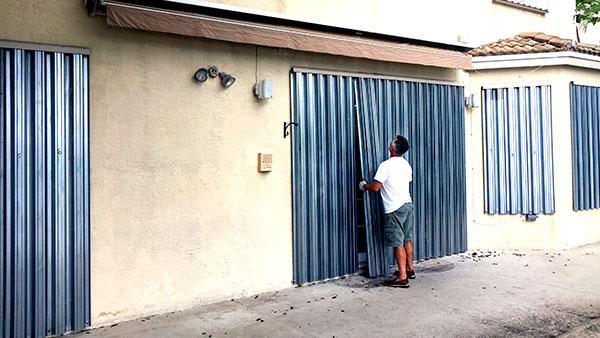
Storm shutters or impact-rated windows and doors can protect homes from storm debris.
The 2020 and 2021 hurricane seasons were two of the most active seasons in history. While hurricanes continue to be among the most catastrophic weather events, the good news is that homeowners have effective and affordable options to help reduce damage.
Adding protection to a home’s window and door openings is the most common mitigation technique to combat hurricane damage, but it can also cause great confusion. Learn the truth about some common myths to help limit damage to your home:
MYTH NO.1
Opening protection is required only on the side of the home that faces the water.
Believing in this myth can leave a homeowner dangerously exposed. Hurricanes in the northern hemisphere spin counterclockwise. Studies conducted after Hurricane Andrew in 1992 focused on conditions specific to South Florida. With storms spinning in a counterclockwise rotation and storms coming from the east and heading north along the Atlantic Coast, the initial wind field commonly resulted in strong easterly winds — winds blowing in off the water.
However, as additional storms arose, further study revealed that the counterclockwise rotation meant winds could come from any direction. As hurricane activity has grown in the Gulf of Mexico over the last 15 years, it has become evident that wind didn’t always come off the water. The spin of a storm can result in winds from any direction, so a home must be protected on all sides.
During Hurricane Irma, the Tampa Bay area received the strongest winds from the south, east and north. Winds were so strong out of the north that they actually blew the water out of Tampa Bay.
With opening protection being the most common and important mitigation technique, it is imperative that it is done correctly. To properly protect a home, ALL glazed windows and doors should be protected, regardless of the direction they face.
MYTH NO. 2
Impact-rated windows don’t break.
Impact-rated windows and doors are designed to prevent flying debris from passing through the house and to keep water out of the house. That said, they can still break, as they are NOT designed to not break. Many homeowners believe that because they have impact-rated windows, the windows won’t break, and they won’t have a claim. This thinking could leave them extremely exposed.
In a strong wind event with lots of debris in the air, it would not be uncommon for several windows to break, resulting in a very large claim. The debris and the water may stay out, but the windows still would need to be replaced. Depending on the size of the home, a complete window replacement could run upwards of $250,000. Impact-rated windows offer great convenience and protection, but they should not be viewed as a superior product to an impact-rated opening protection shutter.
MYTH NO. 3
My windows and doors or garage door are “hurricane-rated,” so my property is safe.
Neither building codes nor the window and door industry recognize a “hurricane-rating” designation. As defined by building code, your windows, doors and garage doors can have two separate ratings: a wind rating and an impact rating. All windows, doors and garage doors have a wind rating no matter where in the country they are used. For coastal areas, this rating is obviously much higher.
Windows, doors and garage doors also may have an impact rating. This rating involves a separate set of testing based on the likelihood of flying debris penetrating the window or door. Local building codes define the required wind ratings for a specific area and determine whether an impact rating is required. Obtaining items such as a wind mitigation form or window and door specifications from the supplier can clearly determine the level of the wind rating and whether that window or door is also impact rated.
Hurricane season in the Northern Hemisphere traditionally runs June 1 to November 30, but the recent active seasons have seen storms in May and December. Homeowners in hurricane zones should be prepared for hurricanes whenever they occur.
This loss control information is advisory only. The authors assume no responsibility for management or control of loss control activities. Not all exposures are identified in this article. Contact your local, independent insurance agent for coverage advice and policy service.
